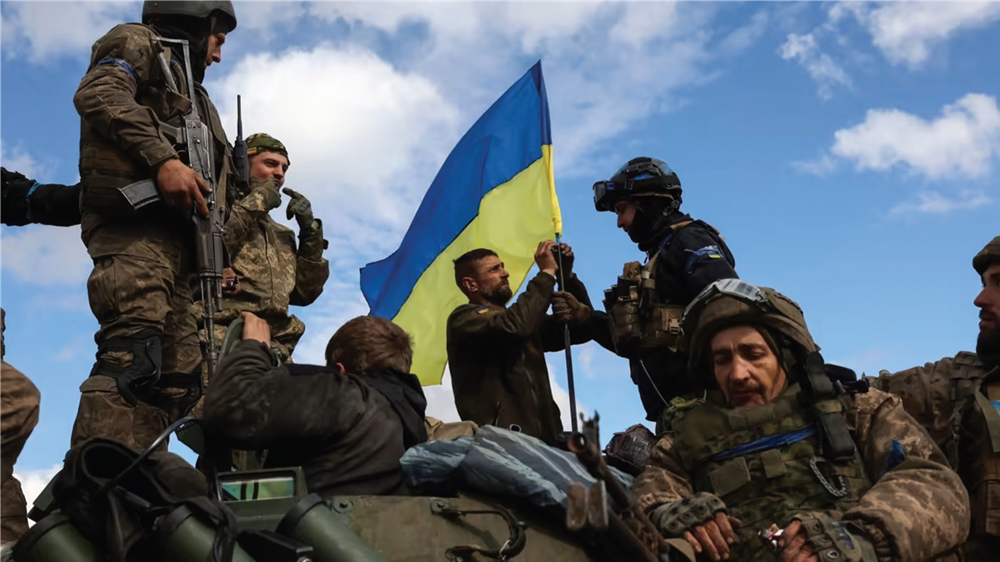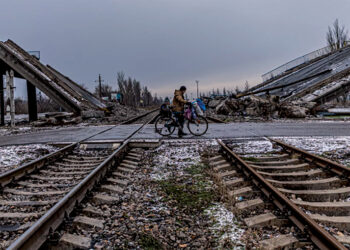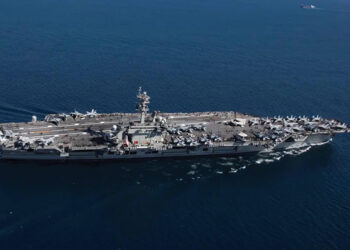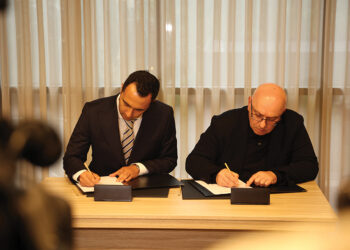INTERVIEW BY VAZHA TAVBERIDZE
In the wake of Ukraine’s audacious Operation Spiderweb—a wave of deep drone strikes inside Russian territory—the international spotlight has returned to the shifting frontlines, both military and diplomatic. Yet, ten days on, the expected Russian retaliation has not materialized.
Alexander Khara, a former senior advisor at Ukraine’s Ministry of Defense spoke with Radio Free Europe’s Georgian Service, warning that proposed Western concessions—whether recognizing Russia’s annexation of Crimea, freezing NATO expansion, or easing sanctions— would not bring peace but instead “open the door to global chaos.” And if Trump believes he can simply charm Vladimir Putin into a deal, Khara says, he is deluding himself.
10 DAYS SINCE OPERATION SPIDERWEB AND PUTIN HAS NOT RESPONDED, AT LEAST NOT WITH A MASSIVE SHOW OF FORCE, AS WAS EXPECTED. WILL HE RESPOND? DOES HE HAVE THE LUXURY NOT TO?
Putin will feel compelled to respond. He does need to project strength. Only, now, he’s increasingly unable to do so. He’s not able to do anything more than he’s doing. Yes, he can send more drones, more missiles – rain down more terror on Ukrainian civilians and cities, but he has already been doing that for a long time now.
The only escalation option left to him— nuclear weapons—is highly unlikely. There’s no military need, and it would provoke a predictable backlash from key allies like China, a major supporter of Russia in this war, or Iran.
Conventional strikes face simple math: you need platforms to launch missiles. Our attacks on their strategic and tactical bombers have reduced that capacity. They can still harass us, but we’ve created a bottleneck—and proved Ukraine still has cards to play.
WHAT HAS OPERATION SPIDERWEB GIVEN UKRAINE FROM A DIPLOMATIC PERSPECTIVE? HOW WILL IT AFFECT THE ONGOING PEACE TALKS?
We showed that we are not losing this war—and that’s hugely important. Yes, Russians are making gains in the East, and now they’re trying to push into Sumy region. And for outsiders—for those without a military background—it might look like Ukraine is losing. Which then leads to this dangerous argument: “Maybe then it’s time to just accept whatever terms Russia puts forward, before it gets even worse.”
But operations like this prove otherwise. They show we have asymmetric tools to fight this war. And more importantly, that we’re not going to stop, give up. I believe it will change minds in the West—especially in Europe.
People are beginning to understand that Russia was never interested in a ceasefire—let alone peace talks or a peace agreement. All this time, they’ve been preparing for a summer offensive. And it might have already begun, starting with Sumy. It’s not yet a full-scale push, but they could escalate.
Why now? Because they see a window of opportunity—especially given the mood in the West and the position of Washington. It’s clear that Trump is not willing to impose costs on Russia for breaching agreements—including the one about the comprehensive, unconditional ceasefire that the US has been trying to negotiate. The Russians never took it seriously. Even that partial ceasefire they supposedly agreed to under Trump—they violated it repeatedly.
What we’ve seen is that Trump is not an impartial broker—he equates the aggressor, Russia, with its victim, Ukraine. He’s unwilling to support us with the same level of weapons as before. So Russia will advance, we’ll defend, and we may launch more strikes deep into Russia—not necessarily on the same scale, but they will continue.
TO WHAT EXTENT WILL THE TRUMP ADMINISTRATION’S REFUSAL TO PROVIDE MORE FUNDS AND WEAPONRY AFFECT UKRAINE’S DECISION-MAKING, OR ROOM TO MANEUVER, BOTH ON THE BATTLEFIELD AND DIPLOMATICALLY?
When President Biden supplied weapons and ammo, he had leverage over Ukraine. Early on, he asked us not to strike Crimea—even though the U.S. doesn’t recognize it as Russian. We agreed and used our own drones and missiles instead. Russia didn’t retaliate, it became routine, and eventually Biden lifted the restriction.
The same happened with strikes inside Russia—initially banned, later allowed because of the dire situation on the battlefield.
Trump, by contrast, won’t have that kind of leverage. He can’t stop Ukrainian drone strikes, nor cut off their supply. That shift gives Ukraine more freedom— and more leverage.
YOU WROTE: “WITHOUT SOLVING THE RUSSIAN PROBLEM, TRUMP WON’T BE ABLE TO SOLVE THE PROBLEMS WITH CHINA, KOREA, IRAN, HAMAS, ETC.—AND THE SECURITY OF EUROPE AND ISRAEL.” DOES HE SEE RUSSIA AS A PROBLEM THAT NEEDS TO BE SOLVED? AND IF SO, HOW IS HE PLANNING TO SOLVE IT?
Unfortunately, no. Since 1991, every U.S. president has tried to build good relations with Russia—and each has failed. The core problem is that U.S. values and interests simply don’t align with Russia’s. Putin’s ideology isn’t conservative or Christian—it’s anti-Western, and it manipulates Western audiences who mistakenly see Russia as a “traditional” country.
There’s also no pulling Russia out of China’s orbit, or getting their help on Iran or North Korea. Their interests align with each other—not with the West.
Trump, however, believes his personal rapport with Putin will work. He sees him as a role model and has echoed his propaganda. And with advisers like Mr. Witkoff—what Lenin might’ve called a “useful idiot”—he’s helping Russia without getting anything back, believing Putin is sincere.
But reality will catch up. There will be no deal with Iran. US intelligence and diplomats will eventually tell Trump: Russia is acting against our interests and backing our enemies. The same will happen with China. Trump may figure it out—but only after time is lost.
LET’S TALK ABOUT THOSE CONCESSIONS THAT THE US APPEARS READY TO OFFER— OR AT LEAST WILLING TO CONSIDER OFFERING—WHEN IT COMES TO NEGOTIATIONS WITH RUSSIA. ONE EXAMPLE FLOATED DURING EARLIER TALKS WAS THE SUGGESTION THAT THE US MIGHT BE WILLING TO RECOGNIZE RUSSIA’S ANNEXATION OF CRIMEA. WHAT WOULD THE GLOBAL IMPLICATIONS OF THAT BE?
Such a move would open the door to global chaos. Many borders in Africa and Latin America were drawn by colonial powers, yet since 1945, these regions have largely avoided wars of conquest. That’s worth preserving. Legitimizing annexation would encourage bad actors— especially in Asia—to pursue territorial grabs, leading to greater instability.
China wouldn’t welcome it either. Their claims over Taiwan rely on the principle of sovereignty and territorial integrity. Allowing forced annexations sets a precedent that undermines their long-term narrative.
And let’s be clear: Ukraine will never recognize the annexation of Crimea— nor will the EU. The European Union was built to prevent Europe’s violent past—conquest, nationalism, world war—from resurfacing. It cannot and will not accept such a precedent.
And this goes beyond Ukraine. Georgia and Moldova are in the same position. They too will never recognize the occupation or annexation of their territories by Russia or its proxies—nor should they.
ANOTHER POSSIBLE CONCESSION REPORTEDLY UNDER DISCUSSION: NATO. THE US SEEMS TO BE FLOATING THE IDEA OF FREEZING UKRAINE’S ASPIRATIONS TO JOIN THE ALLIANCE AS PART OF A POTENTIAL DEAL. THIS WAS ECHOED BY SPECIAL ENVOY GENERAL KEITH KELLOGG, WHO SAID THAT PREVENTING NATO’S EASTWARD EXPANSION WAS A “FAIR CONCERN.” IS IT?
Not at all. Russia is a major power—a nuclear power. But if you look at the recent history, there were no plans by NATO or any NATO country to attack or conquer Russian territory. None. When Russia first attacked Ukraine in 2014, we were a non-aligned country. The majority of Ukrainians were actually against joining NATO.

It was only after Russia illegally annexed Crimea and launched a proxy war in Donbas that President Poroshenko amended the constitution to enshrine NATO membership as a strategic goal. And even then, it was mostly declaratory—we knew the West wasn’t ready to take us in. This narrative that NATO is somehow “dragging” Ukraine into the alliance is false. If anything, we’ve been desperately trying to get in.
You know this well—both Georgia and Ukraine received a symbolic promise of future membership at the 2008 Bucharest Summit. But in reality, countries like Germany and France made it clear they didn’t want us in the alliance. That hesitancy only emboldened Russia, as seen in its 2008 invasion of Georgia.
So no, NATO expansion isn’t the problem. What actually happened was that Central and Eastern European countries were fleeing Russia’s sphere of influence—it was escape, not expansion. Their fears were real, as Russia later proved.
So when Kellogg talks about “fair concerns,” he’s simply wrong. That kind of rhetoric fuels Russian propaganda. Without credible security guarantees, Russia will invade Ukraine again. That’s why NATO remains the only viable option— it’s a nuclear alliance. We don’t want war; we want deterrence.
Let’s see what comes out of the upcoming NATO summit. I expect some positive language in the final communiqué. And Trump can’t override NATO’s consensus-based process. He might promise Putin Ukraine won’t join while he’s in office—but he can’t force NATO or Ukraine to change their positions.
ON THE THIRD POTENTIAL CONCESSION, EASING SANCTIONS: SOME SAY THE TRUMP TEAM IS PRESSURING SENATOR LINDSEY GRAHAM TO SOFTEN THE LANGUAGE IN A SANCTIONS BILL TO MAKE IT MORE PALATABLE TO MOSCOW. WHAT WOULD THAT MEAN IN PRACTICE?
From the beginning, I believe the Obama administration made a key mistake in its assumptions about sanctions. The idea was that sanctions would serve as leverage—that they would be incremental and aimed at changing Putin’s behavior.
But Washington was always cautious not to harm its own interests—or those of its partners. Oil prices and other economic considerations took priority.
What’s been underestimated is how deeply Russia wants to reassert itself as a global power. That ambition outweighs money, the wellbeing of its people, even Russian lives. Nearly a million Russians have been killed or wounded in this war—but for authoritarian leaders, human loss is acceptable if it serves geopolitical goals.
If the Obama administration had treated sanctions as a weapon of war—not just diplomacy—they might have been able to strike at the Russian economy so effectively that it would cripple the Kremlin’s ability to fund its aggression.
But we’re still far from that kind of resolve. Neither the US nor Europe has shown it.
Sanctions now feel like Senator Graham’s personal mission. He’s balancing between Ukraine, Europe, and Trump— staying polite to Trump while pushing for tougher measures on Russia. But I doubt these sanctions will break the Russian economy, especially with China still backing Moscow.
Secondary sanctions are supposed to target countries that enable Russia — India, China, Turkey to some extent, and several Middle Eastern nations. All are helping Russia circumvent sanctions. But what’s worse is that Trump’s team wants to water down the language of these sanctions — and that won’t have a positive effect. Putin believes time is on his side. He can sacrifice another 100,000 soldiers without blinking. He believes the West will eventually falter, that it won’t keep up military aid to Ukraine.
He’s also banking on Russia’s Trojan horses within NATO and the EU — Slovakia and Hungary has taken a harsher stance towards Ukraine. It’s not just historical grievances — there are other motivations as well. Even Poland, following the recent presidential elections, has doubled down on dividing historical issues that strain our bilateral relations—at a time when Ukraine’s survival and Poland’s security are at stake.
Putin’s calculation is simple: if he pushes hard enough, Ukraine will be seen as unable to win. The world, then, will pressure Kyiv to accept unacceptable terms.
WILL THAT PRESSURE WORK? YOU’VE SAID SEVERAL TIMES THE US HAS LOST LEVERAGE OVER UKRAINE, THAT THEY CANNOT FORCE CONSTITUTIONAL CHANGES OR COMPROMISES. GENERAL KELLOGG INFAMOUSLY SAID: “SOMETIMES YOU HAVE TO HIT THE MULE IN THE FACE WITH A 4X4.” AS UNSAVOURY AS THAT COMPARISON IS, DO THEY HAVE ANYTHING LEFT TO HIT THE “MULE” WITH? AND WILL THE “MULE” THEN “BEHAVE”?
No. Because for us, this is a matter of survival. It’s a genocidal war. Putin made his genocidal intent clear in that infamous historical essay — denying the existence of a Ukrainian nation and Ukrainian statehood. What Russian troops did in Bucha, Mariupol, and elsewhere were acts of genocide.
That’s why we cannot agree to these terms. It’s a historical and philosophical struggle. A century ago, our predecessors lost the Ukrainian People’s Republic to the Bolsheviks. We were fighting both the Bolsheviks and the imperial Whites, without national unity and without real external support. Our only ally, Germany, was on the losing side of World War I.
We lost that war. We lost our independence. And a few years later, came the Holodomor — genocide by starvation. Then came the repression of our intellectuals, the destruction of our language, our culture. We remember that.
Others remember their own tragedies. In the Caucasus, people recently marked the genocide of the Circassians—a deep historical wound. Some remember, but many have tragically embraced a Russian imperial identity. They’re not ethnically or culturally Russian—but they’ve become mentally Russian. It’s like a disease.
So no, we can’t accept this war on Russian terms. We know what extinction looks like. But unlike a century ago, we now have national unity, a capable and growing defense force, a developing defense industry, and allies—not just in Europe, but also in Canada, South Korea, Japan, and beyond. This is Ukraine’s historic chance to preserve sovereignty and, possibly, restore territorial integrity.
We understand that.
That’s why we fight — to preserve our sovereignty, and to diminish Russia’s ability to threaten the rest of Europe.














